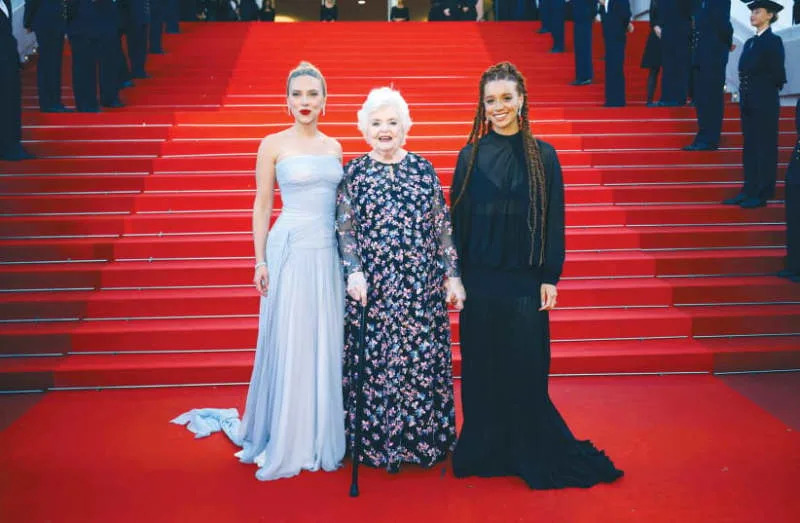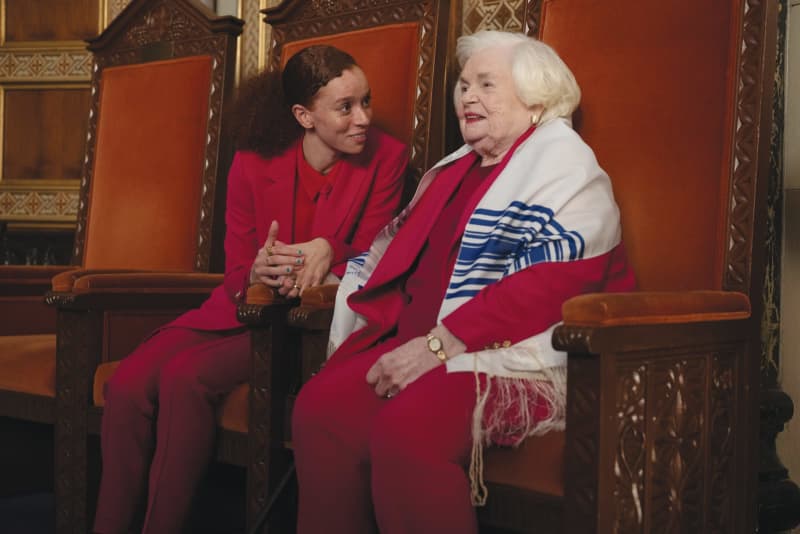FILM REVIEW: Scarlett Johansson’s directorial debut is a moving and joyful love letter to her Jewish heritage.
WithEleanor the Great, a new film that opened throughout Israel on Thursday, actress Scarlett Johansson has made a superb directorial debut, with a low-key character-driven movie that tells a deeply Jewish story of love, the Holocaust, and grief, anchored by three sparkling performances by actresses from different generations: June Squibb in the title role, Rita Zohar, and newcomer Erin Kellyman. It’s also quite funny at times.
It’s Squibb who is at the center, and it was a smart move for Johansson to build a film around her. Squibb, who turned 96 on November 6, is simply a force of nature, an actress who can be funny, wise, exasperating, and kind – sometimes all in the same scene – and who is always relatable.
Like most great actors, she doesn’t have to work hard to get the audience on her side, and like all genuine movie stars, it’s hard to look at anyone else when she’s in the frame. You may remember her from her recent movie Thelma, where she played a grandmother who is determined to get back her life savings after they are stolen from her in a phone scam.
She started in theater in the Midwest and only began acting in film and television when she was in her 50s. She got her breakout role when she was well into her 80s, in Alexander Payne’s Nebraska, for which she received a Best Supporting Actress Oscar nomination. Her performance as Eleanor, a complex, often difficult character, is her greatest role to date.
The movie opens in Florida, where Eleanor shares an apartment with her BFF, Bessie (Rita Zohar), a Holocaust survivor. Both are widows, and their lives revolve around each other. They have lovely camaraderie in their scenes together, and we should all have a friend like this.

DIRECTOR SCARLETT JOHANSSON stands on the red carpet with ‘Eleanor the Great’ cast members June Squibb (center) and Erin Kellyman at the 78th Cannes Film Festival in Cannes, France, in May 2025. (credit: Stephane Mahe/Reuters)
Everyone thinks they are sweet old ladies, but they have a wicked sense of humor. Eleanor is there for Bessie when she has nightmares about the Holocaust. In a particularly well-written scene, Bessie explains how she wanted to move on with her life in the US and never told anyone about the fate of her brother, and she laments the fact that when she dies, he will be completely forgotten.
Bessie herself dies not long after she tells this story to Eleanor, and soon Eleanor finds herself living with her tightly wound daughter, Lisa (Jessica Hecht), in Manhattan. Eleanor drives Lisa crazy in a familiar way, and Lisa is busy with work and wants her mother to move to an assisted living facility.
This is the most unrealistic part of the plot, as there is no indication that the family is wealthy, and such facilities in the New York area cost a fortune and have years-long waiting lists, but it’s best if you can put that out of your mind while watching the film.
Eleanor is staying in a room that belongs to her grandson, Max (Will Price), and she sleeps under his poster for Crumb, the documentary about the profane underground artist R. Crumb and his family, a nice touch.
Lisa sends Eleanor off to a singing club at the Jewish community center, but Eleanor is appalled by the lousy renditions of Broadway hits, and stumbles into another group, which she learns is for Holocaust survivors. She likes these people better and, impulsively, she pretends to fit in and tells Bessie’s story as if it were her own.
The others are moved, and there is a young college student there, Nina (Erin Kellyman), who is writing about the group for a journalism class assignment. She becomes fascinated with Eleanor, and the two develop a friendship that helps fill the void left for Eleanor by Bessie’s death.
Nina also recently suffered a loss, that of her mother, who died suddenly, and she feels isolated. Her father, a famous New York television journalist, Roger (Chiwetel Ejiofor), has withdrawn from her, and taking the journalism class is a way for her to reconnect with him.
This aspect of the film is the weakest, because it is the least developed. We learn that Roger and Nina’s mother fought often and had so many problems that she took off for boarding school to get away from them, but the movie gives no real sense of what was going on.
While Kellyman has a sweet and earnest presence in the movie, Roger is opaque, almost blank. But Ejiofor is such a commanding actor that it’s frustrating that the script gives little sense of who his character really is.
Eleanor’s well-meaning deception gives the story a built-in tension, and we wait for her either to come clean to Nina or for the girl to find out some other way that her new friend is not who she says she is.
The movie, with a script by Tory Kamen that was inspired by aspects of her grandmother’s life, has a plot that is a bit contrived at times, and it can seem like about three movies stitched together. But by the end, it pulls off the emotional catharsis that is building and ties it all together. You will forget the clunky parts, or more likely, you won’t be bothered by them.
An impressive directorial debut for Johansson
Johansson, who is Jewish, is one of the world’s top movie stars, having starred in such action/superhero blockbusters as Black Widow and more indie movies like Lost in Translation. This movie wasn’t an obvious choice for her to make her first film as a director, since it isn’t especially commercial. But she has said in interviews that she cried when she first read the screenplay, and that the story resonated with her after she took part in the Finding Your Roots program on PBS and discovered that many of her relatives were killed in the Warsaw Ghetto.
The movie builds to its well-earned emotional climax in the third act, and Rita Zohar, a Ukrainian-born Holocaust survivor who lived in Israel for years, gets a chance to shine as Bessie. Zohar had a leading role in Jorge Gurvich’s 2009 offbeat movie, Mrs. Moskowitz and the Cats, but I haven’t seen much of her since then. Here, she has a small but key role that gives the movie its soul.
In a just world, all three of the main actresses, Squibb, Kellyman, and Zohar, would earn Oscar nods, and this joyful and gently moving film would find the audience it deserves.
In our imperfect reality, it’s nice that it got made at all.

